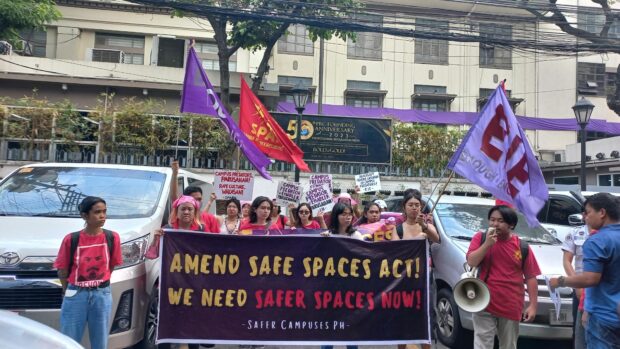Student coalition seeks law’s amendment vs ‘campus predators’

During the International Women’s Day celebration on March 8, Safer Campuses PH holds a picket in front of Professional Regulation Commission office in Manila to seek amendments in the Safe Spaces Act. SAFER CAMPUSES PH
MANILA, Philippines — Marking International Women’s Day on Friday, a coalition of student organizations and councils from across the country has asked authorities to amend the Safe Spaces Act (SSA), citing the alleged persistence of campus-based sexual harassment despite its ratification five years ago.
In a statement, the group Safer Campuses Ph reports that it has monitored at least 61 schools with “campus predators” since the law’s enactment (Republic Act No. 11313) in 2019.
The group claimed that these offenders have just either moved to another school or are still employed by the schools without facing criminal or administrative charges.
READ: Unsafe spaces
Also known as the Bawal Bastos Law, the SSA covers any act that is committed through an unwarranted, unwanted, and uninvited sexual action or remark against a person of any gender identity, regardless of motive.
Article continues after this advertisement“We cannot wait for another victim before our legislators and education officials admit that they have failed to protect students,” said Sophie Reyes, lead convenor of Enough Is Enough, a convening member organization of the coalition.
Article continues after this advertisementDistressing
“It is distressing that instead of bringing about sweeping reforms in the education sector to stamp out campus predators and their enablers, the SSA has miserably failed to serve as a deterrent,” Reyes added.
READ: Safe workplace for all
The group, together with other women’s organizations and progressive groups, protested in front of Mendiola on the same day.
Following the protest, Safer Campuses Ph submitted a position paper at the Professional Regulation Commission office in Sampaloc, Manila. The letter calls for the revocation of professional licenses of campus predators and the removal of their authority to teach and work with students.
The group stated its five major demands in the letter: “1) mandating schools to provide psychological, legal, and financial support for victim-survivors, 2) predators and enablers being charged with criminal and administrative cases, 3) revoking professional licenses and the blacklisting of campus predators, 4) establishing a publicly-available national registry of sex offenders, and 5) non-retaliatory policy to protect students from enabling school administrators.”